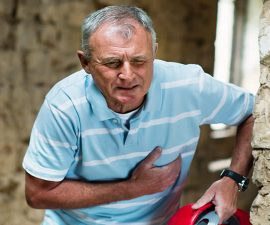… Continued …
Heart problems
The damaged air sacs (alveoli) can affect the flow of blood from the heart to the lung. For one example, sometimes it causes extra pressure and affects the blood vessels that carry blood from the heart to the lung. As a result, the heart is harder to pump blood to the lungs. This pulmonary hypertension may then cause a condition called cor pulmonale.
The symptoms of cor pulmonale are as follows:
- Feeling of breathlessness.
- Fast or increased heartbeat.
- Lightheadedness.
- Sensation or feeling that the heart is pounding.
Cor pulmonale is life-threatening breathlessness. It also often leads to severe, excess fluid buildup in the body. Even sometimes it can cause a shock (an emergency situation in which your body is not getting enough blood supply).
The treatment is dependent on the main cause of cor pulmonale. If it’s a consequence of emphysema, it may become chronic. Some effective treatments are available to help relieve the symptoms and prevent the recurrence.
Giant bullae
Another serious threat is the risk of developing giant bullae (large holes in the lung). Again emphysema can seriously damage the lung, causing permanent damage. And air pockets can develop in there, particularly in areas of the lung that have been completely damaged by the disease.
Over time, an air pocket (a bulla) grows and gets bigger. There may be more than one bulla in the lung. They can band together, causing large holes in the lung.
Giant bullae can significantly interfere with the lungs function. It’s not only bad for the function of the lung where it occurs, but it can also be powerful enough to cause extra pressure that hits the other lung. It will take more space in the chest, too. Consequently, you can experience the following symptoms:
- Discomfort in the chest due to excess pressure in your chest.
- You have difficulty to draw breath.
- Soreness, bloated feeling, and fatigue.
The symptoms usually occur when the giant bullae has become advanced. When the bulla is still small, you may not have noticeable symptoms beyond what you’re experiencing from the underlying emphysema.
The treatment for giant bullae is usually with surgery. Depending on the stage of your giant bullae, surgery can help improve the function of the lung as well as relieve the symptoms. But if the lung is widely and severely destroyed, you may need to take a lung transplant!
- http://www.mayoclinic.org/diseases-conditions/emphysema/basics/complications/con-20014218
- http://www.lung.org/lung-health-and-diseases/lung-disease-lookup/emphysema/




